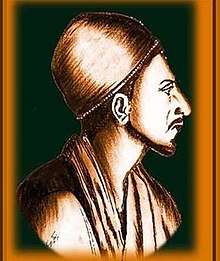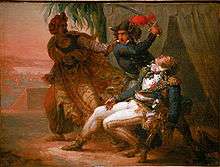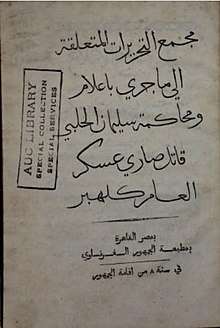Suleiman al-Halabi
| Suleiman al-Halabi | |
|---|---|
 Modern Drawing of Suleiman al-Halabi | |
| Native name | سليمان الحلبي |
| Born |
c. 1777 Aleppo, Syria |
| Died |
c. 1800 Egypt |
| Nationality | Syrian |
| Occupation | Theology student |
| Known for | Assassination of French general Jean Baptiste Kléber |
Suleiman al-Halabi (Arabic: سليمان الحلبي), also spelled Soleyman El-Halaby (1777–1800), was a Syrian theology student in Cairo who assassinated French general Jean-Baptiste Kléber, leader of the French occupation forces in Egypt. He was tortured by burning his hand to the bone before being executed by impalement.
Early life
Suleiman al-Halabi was born in 1777 in Aleppo, Syria (The famous Aleppo historian Khair al-Din al-Asadi mentioned in his book Mawsūʻat Ḥalab al-muqāranah (The Comparative Encyclopedia of Aleppo) that Suleiman Al-Halabi was from the Wannes family and that the Wannes family have a family tree that was verified by many heritage experts confirming his affiliation to the Wannes family in the city of Aleppo and not to the family of Os and the village of Afrin, as mentioned by some researchers and historians. )[1]. His religious father, Mohammad Amin, worked in the profession of selling butter and olive oil.
In 1797, al-Halabi's father sent him to Cairo, Egypt to study Islamic sciences at Al-Azhar University.
Assassination, trial and execution


On June 14, 1800, al-Halabi approached Kléber's home in the guise of a beggar seeking an audience with Kléber. When he approached him, Kléber extended his hand for al-Halabi to kiss in return for some money. Instead, al-Halabi violently pulled the general toward him and stabbed him four times with a stiletto. He was 23 years old when he assassinated the commander of the French campaign on Egyptian soil. Kléber's chief engineer tried to defend him and was stabbed but not mortally wounded.
Al-Halabi hid in a nearby park where he was found by French soldiers, who searched him and found his stiletto. He was arrested and tortured, his right arm burnt to the bone while he denied any relationship with Sheikh Al-Sharkawi or the popular resistance movements. He was tried and sentenced to death by impalement.
Aftermath
Today his skull and stiletto are on display at the Musée de l'Homme in Paris, under the caption, "Criminal," written in French.
An Arab nationalist play based on his assassination of General Kléber, "Sulayman Al-Halabi," was written by Egyptian playwright Alfred Farag in 1965. In Farag's interpretation, Al-Halabi's motives have more to do with popular Arab revolt against foreign occupation and tyranny, rather than political assassination for financial gain.
References
- ↑ (Source in Arabic) http://www.aladeyat.org/other_files/Pdf/asadi.pdf page Nr.1574
External links
- https://web.archive.org/web/20080427071141/http://www.tirejafrin.com/s-alhalabee.htm [Dead]
- http://www.coptichistory.org/new_page_830.htm
- http://www.coptichistory.org/new_page_831.htm
Gazetteer Syrian Volume II page 668